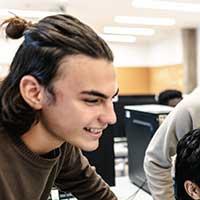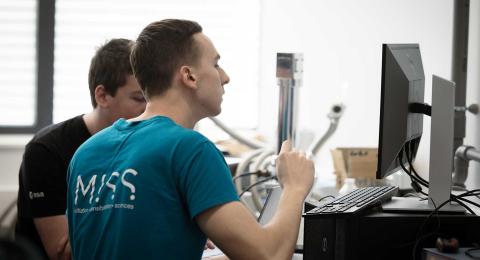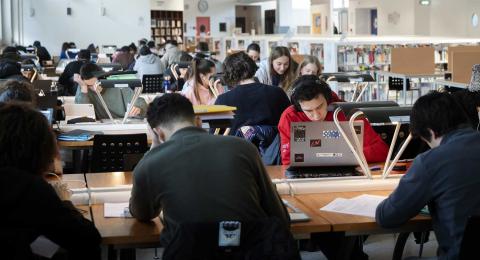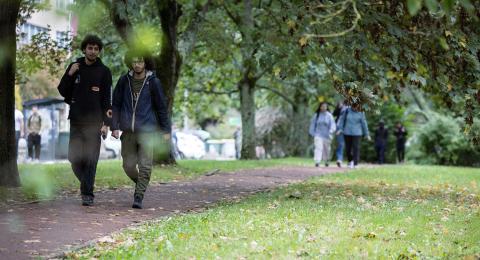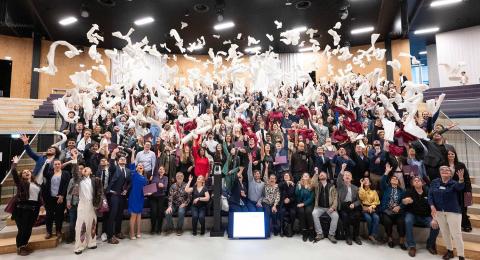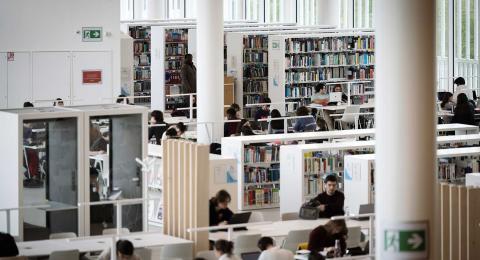You are looking for a training in research to tackle tomorrow’s scientific challenges? The Master 2 program Stem Cell, Development and Cancer (SDC) offers you the opportunity to gain advanced expertise in the latest discoveries and tools in cell and molecular biology, and their applications in the fields of stem cell biology, developmental genetics, and human pathologies such as cancer.
The SDC program is organized into three blocks of teaching units designed to progressively strengthen your expertise and research skills. What makes this pathway unique is its blend of cutting-edge lectures inspired by the latest scientific breakthroughs, and hands-on training in real-world research methodology. Advanced courses in cell imaging and practical workshops will immerse you at the very heart of experimentation and data analysis. Elective courses will allow you to tailor your path according to your interests and career goals. With the help of your supervisor, you will also design a research project before embarking on a six-month laboratory internship.
Whether you envision a career in research or engineering, SDC will provide you with the tools and confidence to achieve your goals.
Information
Skills
The skills targeted in the Master 2 SDC are aligned with those of the Cellular and Molecular Biology program, in which you will graduate:
- Acquisition of a highly specialized knowledge and expertise in the fields of cellular and molecular biology to study stem cell biology, developmental genetics or human diseases such as cancer.
- Ability to design and lead cutting-edge research and turn innovative ideas into new scientific knowledge.
- Ability to communicate and present concepts and data with clarity - in French or English - using academic standards and modern digital tools.
- Ability to analyze and adapt your actions in a professional environment and demonstrate autonomy, teamwork, rigor, and integrity.
Objectives
The goal of the Master 2 SDC is to offer a training through and for research, equipping you to understand recent scientific breakthroughs and tackle today’s major challenges in stem cell biology, developmental genetics, and human diseases such as cancer. By joining SDC, you will:
- Study in a stimulating international environment.
- Build skills at the interface of fundamental biology and biomedical research.
- Prepare for careers in the academic or private sector.
The first semester combines theoretical and practical training with a literature review project linked to your internship.
- At the heart of the program, a series of cutting-edge lectures will explore three main themes: (1) Cellular dynamics and multicellular organization, (2) Signaling in development and diseases, and (3) Stem cells, cellular transitions, and plasticity. Among our partners are several major institutes of the University of Paris-Saclay, known for their expertise in cancer, development, and cell biology.
- Linked to these lectures, progressive learning activities will guide you step by step in developing critical thinking, scientific questioning, and the codes of written and oral scientific communication.
- Elective courses will provide you the unique opportunity to tailor your pathway with topics such as Non-coding RNAs and Epigenetics, Neural Stem Cells and Nervous System Development, Mechanisms of Cell Death, or even Introduction to Entrepreneurship.
- Two practical courses provide immersive training in real research settings. The first, focused on bioimaging, will train you on digital image analysis, with applications in DNA damage or cell cycle studies. The second explores diverse techniques and experimental strategies for analyzing stem cells in vitro or in vivo (mouse, Xenopus, Drosophila models). You may also apply for practical courses at the Pasteur Institute, such as Mouse Genetics for Disease Modelling or Molecular Biology of the Cell.
- A supervised scientific project, closely tied to your upcoming internship, will culminate in a written literature review and an oral presentation.
The second semester is fully dedicated to a six-month research internship, linked to the program’s scientific themes.
- You have the opportunity to apply in one of the many laboratories at Paris-Saclay University or choose a lab elsewhere in France or abroad. A range of international mobility opportunities are available through the university and the Graduate School Life Sciences and Health.
- The internship is assessed through a written thesis and an oral defense.
Career Opportunities
Career prospects
Après un Master : Data scientist
Après Master + Doctorat : chercheur ou enseignant-chercheur
Après un Master ou Master + Doctorat : chercheur ou enseignant-chercheur
Après un Master ou Master + Doctorat : ingénieur (R&D, contrôle, production…)
Après un Master ou Master + Doctorat : ingénieur (recherche-développement, contrôle, production…) dans les domaines santé, pharmacie, agroalimentaire, biotechnologies, instruments et réactifs, cosmétique, dépollution et environnement
Après un Master ou Master + Doctorat : ingénieur (recherche et développement, contrôle, production…)
Further Study Opportunities
Formation d'attaché.e ou assistant.e de Recherche Clinique
former des spécialistes de niveau international, produisant des travaux compétitifs au sein d’équipes reconnues des établissements publics à caractères scientifique et technologique (EPST), INSERM et CNRS en particulier
ngénierie études, recherche et développement
Thèse de doctorat
Fees and scholarships
The amounts may vary depending on the programme and your personal circumstances.
Capacity
Available Places
Target Audience and Entry Requirements
The International Master’s Program SDC is designed for motivated students in Biology, Medicine, or Pharmacy, who are eager to strengthen their expertise in cell and developmental biology, cancer or other human diseases.
Applicants should:
- Hold a Master 1 degree (or equivalent 4-year bachelor’s in science with a major in Biology).
- Demonstrate a strong background in cell and molecular biology.
- Have completed coursework related to the core topics of the M2 curriculum.
- Have a minimum B2 English proficiency level. No need to be fluent, the Master 2 SDC will help you strengthen your language skills through immersion in an international environment!
Application Period(s)
From 01/02/2026 to 31/03/2026
From 01/05/2026 to 03/07/2026
Supporting documents
Compulsory supporting documents
Copy diplomas.
Copy of identity document.
Motivation letter.
All transcripts of the years / semesters validated since the high school diploma at the date of application.
Certificate of English level.
Curriculum Vitae.
Detailed description and hourly volume of courses taken since the beginning of the university program.
Additional supporting documents
Certificate of English level (compulsory for non-English speakers).
VAP file (obligatory for all persons requesting a valuation of the assets to enter the diploma).
Recommendation letters.
Document indicating the list of local M2 choices available here : https://urlz.fr/i3Lo.
Supporting documents :
- Residence permit stating the country of residence of the first country
- Or receipt of request stating the country of first asylum
- Or document from the UNHCR granting refugee status
- Or receipt of refugee status request delivered in France
- Or residence permit stating the refugee status delivered in France
- Or document stating subsidiary protection in France or abroad
- Or document stating temporary protection in France or abroad.
| Subjects | ECTS | Semestre | Lecture | directed study | practical class | Lecture/directed study | Lecture/practical class | directed study/practical class | distance-learning course | Project | Supervised studies |
|---|---|---|---|---|---|---|---|---|---|---|---|
| Elective course | |||||||||||
| Neural stem cells and neurogenesis | Semestre 1 | 15 | 5 | ||||||||
| Analyse multiparamétrique des voies de signalisation à l’échelle cellulaire - UPSaclay | Semestre 1 | 7 | 18 | ||||||||
| Other course (upon pedagogical agreement) | Semestre 1 | ||||||||||
| Non-coding RNAs and epigenetics | Semestre 1 | 25 | |||||||||
| Innovation and entrepreneurship in biotechnology (IEB) | Semestre 1 | 22.5 | |||||||||
| Core course and Colloquium | |||||||||||
| Core course Stem cells, Development, Cancer | Semestre 1 | 32 | 32 | ||||||||
| Subjects | ECTS | Semestre | Lecture | directed study | practical class | Lecture/directed study | Lecture/practical class | directed study/practical class | distance-learning course | Project | Supervised studies |
|---|---|---|---|---|---|---|---|---|---|---|---|
| Stem Cell practical course | Semestre 1 | 6 | 4 | 60 | |||||||
| Bioimaging - Biological Digital Image Processing and Analysis | Semestre 1 | 10 | 15 | ||||||||
| Bioimaging - Hands on | Semestre 1 | 18 | |||||||||
| Subjects | ECTS | Semestre | Lecture | directed study | practical class | Lecture/directed study | Lecture/practical class | directed study/practical class | distance-learning course | Project | Supervised studies |
|---|---|---|---|---|---|---|---|---|---|---|---|
| Scientific Project | Semestre 1 | ||||||||||
| Internship | Semestre 2 | ||||||||||
| Subjects | ECTS | Semestre | Lecture | directed study | practical class | Lecture/directed study | Lecture/practical class | directed study/practical class | distance-learning course | Project | Supervised studies |
|---|---|---|---|---|---|---|---|---|---|---|---|
| Core course and Colloquium | |||||||||||
| Core course Stem cells, Development, Cancer | Semestre 1 | 32 | 32 | ||||||||
| Subjects | ECTS | Semestre | Lecture | directed study | practical class | Lecture/directed study | Lecture/practical class | directed study/practical class | distance-learning course | Project | Supervised studies |
|---|---|---|---|---|---|---|---|---|---|---|---|
| Mouse Genetics for disease modelling (Pasteur course) | Semestre 1 | 70 | 70 | ||||||||
| Bioimaging - Biological Digital Image Processing and Analysis | Semestre 1 | 10 | 15 | ||||||||
| Molecular Biology of the Cell (Pasteur course) | Semestre 1 | 60 | 80 | ||||||||




